| Listing 1 - 9 of 9 |
Sort by
|
Book
ISBN: 0716716895 0716716887 9780716716891 9780716716884 Year: 1985 Publisher: New York Freeman
Abstract | Keywords | Export | Availability | Bookmark
 Loading...
Loading...Choose an application
- Reference Manager
- EndNote
- RefWorks (Direct export to RefWorks)
Cognitive psychology --- Intellect --- Cognition --- Cognition. --- Intelligence. --- 159.928 --- 159.955 --- 159.95*1 --- Psychology --- Cognitive Function --- Cognitions --- Cognitive Functions --- Function, Cognitive --- Functions, Cognitive --- Begaafdheid. Intelligentie --- Denken. Abstractievermogen --- Cognitieve psychologie --- Intellect. --- 159.95*1 Cognitieve psychologie --- 159.955 Denken. Abstractievermogen --- 159.928 Begaafdheid. Intelligentie --- Intelligence --- Human intelligence --- Mind --- Ability --- Thought and thinking
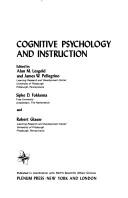
ISBN: 0306328860 1468425374 1468425358 Year: 1978 Volume: 5 Publisher: New York (N.Y.): Plenum
Abstract | Keywords | Export | Availability | Bookmark
 Loading...
Loading...Choose an application
- Reference Manager
- EndNote
- RefWorks (Direct export to RefWorks)
Cognitive psychology --- Educational psychology --- Cognition --- Learning --- Psychology --- Teaching --- Cognition in children --- Cognition chez l'enfant --- Psychopédagogie --- Congresses --- Congrès --- -Educational psychology --- -Education --- Psychology, Educational --- Child psychology --- Cognition (Child psychology) --- Thought and thinking in children --- Congresses. --- -Congresses --- Psychopédagogie --- Congrès
Book
ISBN: 1317483332 1138898376 1315708590 1138898368 1317483340 Year: 2017 Publisher: Taylor & Francis
Abstract | Keywords | Export | Availability | Bookmark
 Loading...
Loading...Choose an application
- Reference Manager
- EndNote
- RefWorks (Direct export to RefWorks)
This book highlights the importance of validity evidence based on response processes and provides guidance to measurement researchers and practitioners in creating and using such evidence as a regular part of the assessment validation process. Response processes refer to approaches and behaviors of examinees when they interpret assessment situations and formulate and generate solutions as revealed through verbalizations, eye movements, response times, or computer clicks. Such response process data can provide information about the extent to which items and tasks engage examinees in the intended ways. It includes chapters that focus on methodological issues and on applications across multiple contexts of assessment interpretation and use. In Part I of this book, contributors discuss the framing of validity as an evidence-based argument for the interpretation of the meaning of test scores, the specifics of different methods of response process data collection and analysis, and the use of response process data relative to issues of validation as highlighted in the joint standards on testing. In Part II, chapter authors offer examples that illustrate the use of response process data in assessment validation. These cases are provided specifically to address issues related to the analysis and interpretation of performance on assessments of complex cognition, assessments designed to inform classroom learning and instruction, and assessments intended for students with varying cultural and linguistic backgrounds.
Educational tests and measurements --- Standards. --- Educational assessment --- Educational measurements --- Mental tests --- Tests and measurements in education --- Psychological tests for children --- Psychometrics --- Students --- Examinations --- Psychological tests --- Rating of --- Andreas Oranje --- Applications of Educational Measurement and Assessment --- Assessment --- Brian D. Gane --- Deirdre Kerr --- Educational Assessment --- Educational Evaluation --- Educational Measurement --- Educational Methodology --- Ercikan --- Evaluation --- Game-Based Assessment --- Gerald Tindal --- Guillermo Solano-Flores --- Isaac I. Bejar --- Jacqueline P. Leighton --- James W. Pellegrino --- Joanna Gorin --- Joseph F. T. Nese --- Julie Alonzo --- Kristen Huff --- Laura Wright --- Lauress L. Wise --- Leilani S --- Louis V. DiBello --- Magda Chía --- Michael Kane --- NCME --- Paul Nichols --- Pellegrino
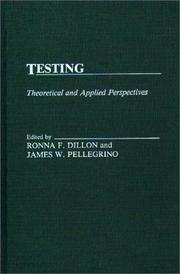
ISBN: 0275927598 Year: 1989 Publisher: New York : Praeger,
Abstract | Keywords | Export | Availability | Bookmark
 Loading...
Loading...Choose an application
- Reference Manager
- EndNote
- RefWorks (Direct export to RefWorks)
Educational tests and measurements --- Intelligence tests --- Military research --- Psychological tests --- Tests et mesures en éducation --- Intelligence --- Recherche militaire --- Tests psychologiques --- Tests --- United States --- Etats-Unis --- Armed Forces --- Examinations --- Forces armées --- Examens
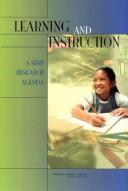
ISBN: 1280179333 9786610179336 0309527627 9780309527620 6610179336 0309090814 9780309090810 030916673X 9781280179334 9780309166737 Year: 2004 Publisher: Washington, D.C. National Academies Press
Abstract | Keywords | Export | Availability | Bookmark
 Loading...
Loading...Choose an application
- Reference Manager
- EndNote
- RefWorks (Direct export to RefWorks)
Education --- Reading --- Mathematics --- Science --- Research --- Study and teaching
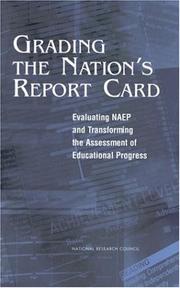
ISBN: 0309062853 9786612081972 1282081977 0309524830 0585027501 9780585027500 9780309062855 0305062853 9781282081970 661208197X 9780309524834 0309173620 9780309173629 Year: 1999 Publisher: Washington National Academy Press
Abstract | Keywords | Export | Availability | Bookmark
 Loading...
Loading...Choose an application
- Reference Manager
- EndNote
- RefWorks (Direct export to RefWorks)
Education --- Educational tests and measurements --- Social Sciences --- Theory & Practice of Education --- Evaluation --- 371.26 --- 371.26 Beoordeling van leerlingen. Schoolprestaties. Leerprestaties. Onderwijstaxonomie --- Beoordeling van leerlingen. Schoolprestaties. Leerprestaties. Onderwijstaxonomie --- Evaluation. --- National Assessment of Educational Progress (Project) --- NAEP --- Education Commission of the States. --- Educational Testing Service. --- National Center for Education Statistics. --- Exploratory Committee on Assessing the Progress of Education --- Committee on Assessing the Progress of Education --- National Assessesment of Education Progress (Project) --- United States --- Evaluación Nacional del Progreso Educativo --- Center for the Assessment of Educational Progress (Educational Testing Service).
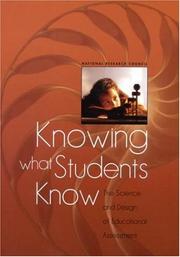
ISBN: 0309072727 9786610185207 1280185201 0309512387 9780309512381 9780309072724 0305072727 9780309072724 0309132932 9780309132930 9781280185205 6610185204 Year: 2001 Publisher: Washington, DC National Academy Press
Abstract | Keywords | Export | Availability | Bookmark
 Loading...
Loading...Choose an application
- Reference Manager
- EndNote
- RefWorks (Direct export to RefWorks)
EDUCATION --- Testing & Measurement --- Educational tests and measurements --- Cognitive learning theory --- Education --- Social Sciences --- Theory & Practice of Education --- Design and construction --- #PBIB:2002.3 --- 371.3 --- Didaktiek. Onderwijsmethoden. Evaluatie van het lesgeven --- 371.3 Didaktiek. Onderwijsmethoden. Evaluatie van het lesgeven --- Cognitive learning theory. --- Design and construction. --- Cognitive theory of learning --- Educational assessment --- Educational measurements --- Mental tests --- Tests and measurements in education --- Psychological tests for children --- Psychometrics --- Students --- Examinations --- Psychological tests --- Learning, Psychology of --- Rating of
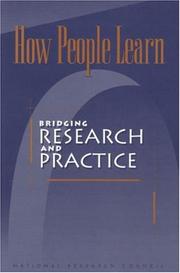
ISBN: 0309065364 0309519462 0585243379 9780585243375 9780309065368 0305065364 9780309519465 030918584X Year: 1999 Publisher: Washington, D.C. National Academy Press
Abstract | Keywords | Export | Availability | Bookmark
 Loading...
Loading...Choose an application
- Reference Manager
- EndNote
- RefWorks (Direct export to RefWorks)
Learning - Research. --- Learning --- Learning, Psychology of --- Education --- Social Sciences --- Theory & Practice of Education --- Research --- Social aspects --- Learning, Psychology of. --- Research. --- Social aspects. --- Learning process --- Psychology of learning --- Psychological aspects --- Comprehension --- Educational psychology --- Learning ability
Book
ISBN: 9780309293228 Year: 2001 Publisher: Washington : The National Academy Press,
Abstract | Keywords | Export | Availability | Bookmark
 Loading...
Loading...Choose an application
- Reference Manager
- EndNote
- RefWorks (Direct export to RefWorks)
Knowing What Students Know essentially explains how expanding knowledge in the scientific fields of human learning and educational measurement can form the foundations of an improved approach to assessment. These advances suggest ways that the targets of assessment-what students know and how well they know it-as well as the methods used to make inferences about student learning can be made more valid and instructionally useful. Principles for designing and using these new kinds of assessments are presented, and examples are used to illustrate the principles. Implications for policy, practice, and research are also explored.
| Listing 1 - 9 of 9 |
Sort by
|

 Search
Search Feedback
Feedback About UniCat
About UniCat  Help
Help News
News